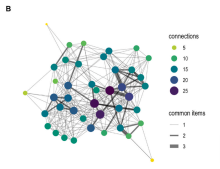Burials provide valuable information to study social structures based on the assumption that burials and associated grave goods can represent social roles and relations in a society. To study social relationships, network analysis has been increasingly applied to archaeological data to infer interactions and relationships between entities. Statistical approaches to network analysis, such as exponential random graph models (ERGMs), provide a way to test hypotheses about dynamic processes of network formation. However, computational difficulties and sensitivity to uncertainties limit the application of ERGMs. In this paper, we introduce a Bayesian framework on ERGMs that enables an efficient computational process, effective quantification of uncertainty, and robust model evaluation of network properties. We tested a hypothesis of social change relative to the arrival of Europeans by studying burial data from Kiwulan, an Iron Age site in northeastern Taiwan. The results indicate a transition among the burials from network ties based on ritual objects to wealth objects, and a more centralized structure with increased social differentiation after the European presence was established in the 17th century. Our case study demonstrates the effectiveness of Bayesian network analysis for archaeological data, and expands the use of burials in understanding the impacts of colonial presence on Indigenous groups in a pericolonial context.
A Bayesian networks approach to infer social changes in burials in northeastern Taiwan during the European colonization period
Wang, Li-Ying and Ben Marwick (2021). A Bayesian networks approach to infer social changes in burials in northeastern Taiwan during the European colonization period. Journal of Archaeological Science 134: 105471
Adviser
View PDF
(4.21 MB)
